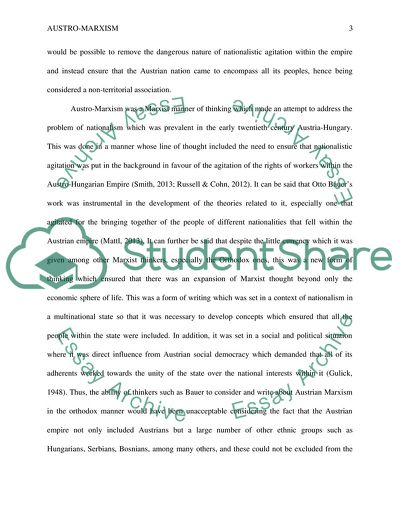Cite this document
(Marxism and Nationalism: Theoretical Origins of a Political Crisis Report Example | Topics and Well Written Essays - 2500 words, n.d.)
Marxism and Nationalism: Theoretical Origins of a Political Crisis Report Example | Topics and Well Written Essays - 2500 words. https://studentshare.org/sociology/1828626-cultures-and-ideas-in-20th-century-europe-discuss-origins-and-development-of-austro-marxism-in-the-context-of-social-transformation-and-intellectual-life-in-the-hapsburg-empire
Marxism and Nationalism: Theoretical Origins of a Political Crisis Report Example | Topics and Well Written Essays - 2500 words. https://studentshare.org/sociology/1828626-cultures-and-ideas-in-20th-century-europe-discuss-origins-and-development-of-austro-marxism-in-the-context-of-social-transformation-and-intellectual-life-in-the-hapsburg-empire
(Marxism and Nationalism: Theoretical Origins of a Political Crisis Report Example | Topics and Well Written Essays - 2500 Words)
Marxism and Nationalism: Theoretical Origins of a Political Crisis Report Example | Topics and Well Written Essays - 2500 Words. https://studentshare.org/sociology/1828626-cultures-and-ideas-in-20th-century-europe-discuss-origins-and-development-of-austro-marxism-in-the-context-of-social-transformation-and-intellectual-life-in-the-hapsburg-empire.
Marxism and Nationalism: Theoretical Origins of a Political Crisis Report Example | Topics and Well Written Essays - 2500 Words. https://studentshare.org/sociology/1828626-cultures-and-ideas-in-20th-century-europe-discuss-origins-and-development-of-austro-marxism-in-the-context-of-social-transformation-and-intellectual-life-in-the-hapsburg-empire.
“Marxism and Nationalism: Theoretical Origins of a Political Crisis Report Example | Topics and Well Written Essays - 2500 Words”. https://studentshare.org/sociology/1828626-cultures-and-ideas-in-20th-century-europe-discuss-origins-and-development-of-austro-marxism-in-the-context-of-social-transformation-and-intellectual-life-in-the-hapsburg-empire.


